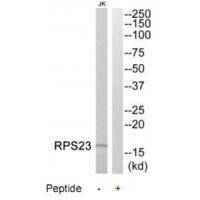Product Detail
Product NameRPS23 Antibody
Host SpeciesRabbit
ClonalityPolyclonal
PurificationThe antibody was affinity-purified from rabbit antiserum by affinity-chromatography using epitope-specific immunogen.
ApplicationsWB
Species ReactivityHu
SpecificityThe antibody detects endogenous levels of total RPS23 protein.
Immunogen TypePeptide
Immunogen DescSynthesized peptide derived from N-terminal of human RPS23.
Target NameRPS23
ConjugateUnconjugated
Other Names40S ribosomal protein S23; RS23;
Accession NoSwiss-Prot: P62266
NCBI Gene ID: 6228
Uniprot
P62266
Gene ID
6228;
Sdspage MW16kd
Concentration1.0mg/ml
FormulationRabbit IgG in phosphate buffered saline (without Mg2+ and Ca2+), pH 7.4, 150mM NaCl, 0.02% sodium azide and 50% glycerol.
StorageStore at -20˚C
Application Details
Western blotting: 1:500~1:3000
Western blot analysis of extracts from Jurkat cells, using RPS23 antibody #34336.
Ribosomes, the organelles that catalyze protein synthesis, consist of a small 40S subunit and a large 60S subunit. Together these subunits are composed of 4 RNA species and approximately 80 structurally distinct proteins. This gene encodes a ribosomal protein that is a component of the 40S subunit. The protein belongs to the S12P family of ribosomal proteins. It is located in the cytoplasm. The protein shares significant amino acid similarity with S. cerevisiae ribosomal protein S28. As is typical for genes encoding ribosomal proteins, there are multiple processed pseudogenes of this gene dispersed through the genome.
Hori N., Nucleic Acids Res. 21:4394-4394(1993).
Ebert L., Submitted (JUN-2004) to the EMBL/GenBank/DDBJ databases.
Vladimirov S.N., Eur. J. Biochem. 239:144-149(1996).
If you have published an article using product 34336, please notify us so that we can cite your literature.
et al,The translational landscape of human vascular smooth muscle cells identifies novel short open reading frame-encoded peptide regulators for phenotype alteration InCardiovasc ResOn 2023 Jul 6byKang Li , Bin Li et al..PMID:36943764
, (2023),
PMID:
36943764
et al,The cardiac translational landscape reveals that micropeptides are new players involved in cardiomyocyte hypertrophy
, (2021),
PMID:
33677093



 Yes
Yes



